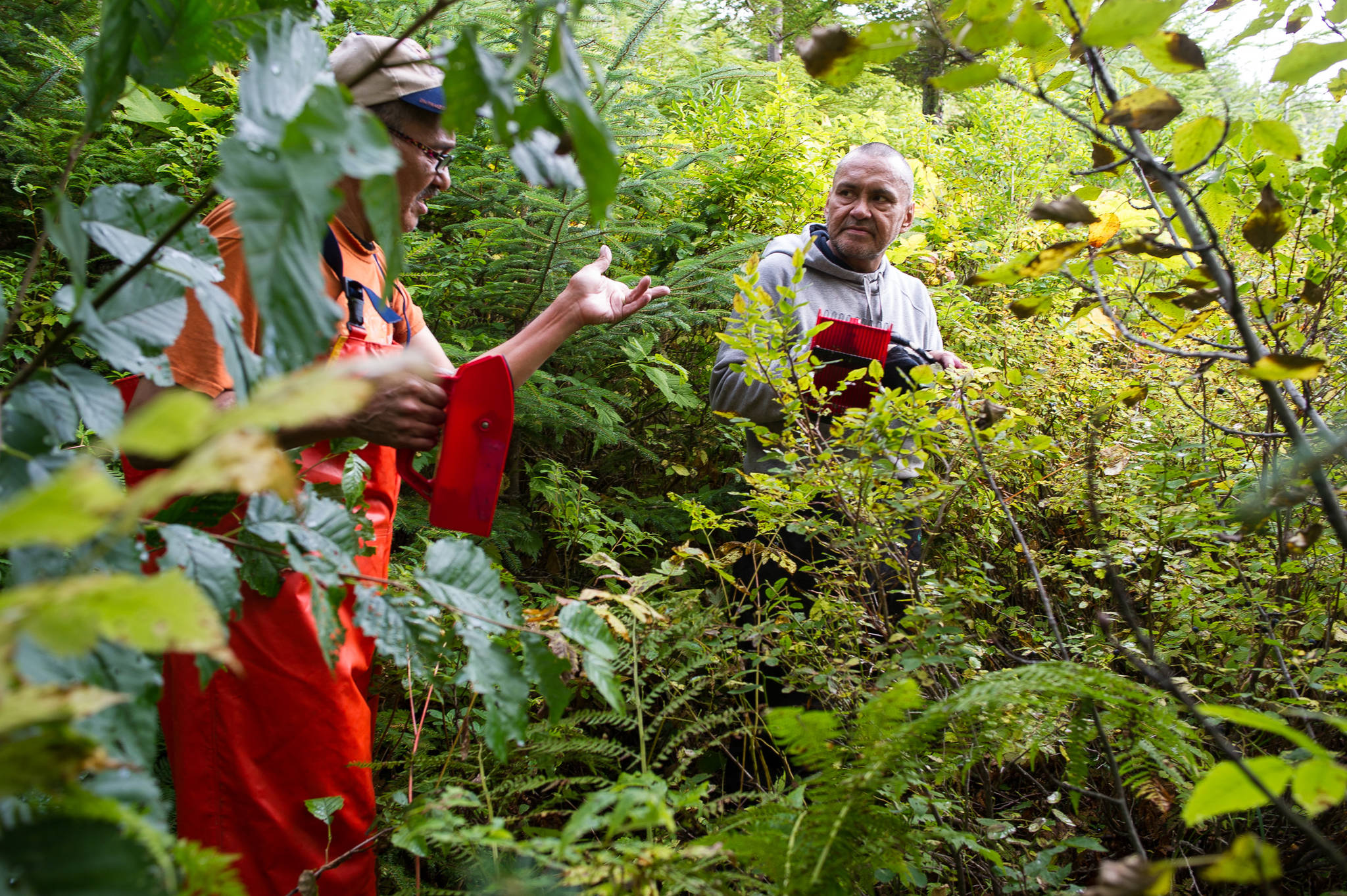A rock quarry surrounded by second growth and alder trees: the land in front of berry pickers Thomas Sanders and Harold McKinley Jr. didn’t look all that special.
The area had been clear cut and logged by landowner Goldbelt Inc. some 20 years ago. Stumps, weeds and fallen logs choked the hillside surrounding the quarry. A few logging roads weave in and out of the thickets. Tracks from an ATV motorist scar the quarry.
At a fruitful location, Sanders and McKinley — productive, “high liner” berry pickers from Hoonah — can pick up to 90 pounds of blueberries a day. McKinley said he’s picked about 200 pounds in less than two weeks this year. In 2014, one of his best seasons, he picked 1400 pounds of berries in six weeks.
Though there are more productive berry picking spots in Juneau, McKinley and Sanders are making a day of it at the plot of Goldbelt land near Echo Cove. In a week or so, McKinley Jr. might head back to more lucrative grounds in Hoonah.
“There are more berries over there, but there are over 3,500 bears — brown bears — and only 800, 900 humans,” McKinley said.
Both Alaska Natives, Sanders and McKinley Jr. have both been picking berries since they were small children. It’s always been part of their way of life. But with a new program starting up at Goldbelt Corp., the tradition and food source will take on another meaning: it’ll become a source of employment.
Taking a cue from the gig economy and the farm-to-table movement, Goldbelt has started their tentatively-titled “Goldbelt Wild” project. It works a bit like commercial fishing, with Goldbelt acting as the seafood company and foragers as independent contractors. Foragers and berry pickers — who don’t have to be shareholders — will be allowed to forage on Goldbelt land and sell their products to the corporation.
Goldbelt will then market the forest products and give each forager 65 percent of whatever they can sell the product for. They’re also partnering with Hoonah Indian Association and Sealaska to open up more land.
The idea is twofold. Goldbelt wants to provide “lifestyle-compatible employment opportunities” for their shareholders while producing more value out of Goldbelt’s land, project director Anthony Lindoff said.
It’s also a way for to uphold Native foraging traditions.
“It’s not just enough to provide jobs or economic opportunity,” Lindoff said while berry picking on Wednesday. “The angle that I am coming from is it’s going to get us back to being on our land, right, which from an ANCSA (Alaska Native Claims Settlement Act) perspective is one of the most tangible benefits we can provide our shareholders. access to our land, that’s really what ANCSA was predicated on anyway.”
Right now, berry pickers make $3.25 a pound for blueberries. Goldbelt’s berries sell for more than your typical mass-produced product. Because Goldbelt is a private corporation, they can get their land certified organic, allowing them to enter their products in high-end markets. They received organic certification on the plot of land near Echo Cove this month.
Currently, Goldbelt is selling most of their berries to an Alaska company called Denali Biotechnologies. There, the berries are turned into a nutrient powder called “AuroraBlue” — a dried berry concentrate they say benefits cardiovascular health and promotes healthy aging.
Goldbelt Wild is just in its infancy — they have just four pickers in Juneau right now — but Lindoff has high hopes for the program. McKinley and Sanders have helped him test methods for foraging devil’s club buds, nettles and wildflowers. He also hopes to get into mushrooms, which aren’t a traditional Native food, but could prove lucrative.
Goldbelt is looking for more berry pickers right now. Those who apply do not have to be share holders.
“It’s about jobs, yeah, but it’s also about maintaining our identity. That’s why we’re excited about this opportunity,” Lindoff said.
• Contact reporter Kevin Gullufsen at 523-2228 or kevin.gullufsen@juneauempire.com.

